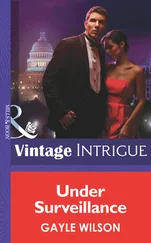The woman, looking up from the brochure, gave her a faint, querying smile of uncertain recognition, which Lucy fought to return in kind before walking on and putting as great a distance as she could between herself and the couple whose lives she had so confidently terminated earlier in the day.
Well, of course, she thought, as she found a seat out of the wind on the deserted stern deck, there are a million different kinds of silver cars. They have a silver car, the Infiniti was silver — two and two make five. It was the sort of mistake anyone in shock might make. Except she wasn’t anyone. She’d always prided herself in questioning her own assumptions — how could she have been so fucking dumb? She wanted to weep.
Unpleasantly aware that she was no longer alone, she looked up and saw the man she now thought of as the terrorist. He appeared to be running a fever, or maybe was just trembling as a result of his ordeal. His hollow grin was still in place, as if he were wearing a monkey mask.
He stepped toward her. “Cigarette,” he said. “You want?” and held out a pack with an unfamiliar logo, probably Canadian.
“No,” Lucy said. Smoking had been forbidden on the ferries for years, though the ashtrays between the seats outside hadn’t been removed. She pointed at the NO SMOKING sign. The man looked around the empty deck, then winked at her. Turning away, cupping his hands against the wind, he made his smoker’s stink. After officiously shaking his match to kill the flame, he turned back to her. “You go to game?”
She allowed herself a brief sigh of irritation. “No. What game?”
“Blue Jays,” he said. “And Seattle Mariners.”
“I don’t follow baseball,” she said with crisp finality.
“Big Blue Jays fan.” The pest tapped the front of his cap.
Lucy made a show of setting her notebook on her knees and getting out her pen.
“Writing!” he exclaimed, making it sound a bizarre activity like pigeon racing or numismatics.
“Sorry. I’m busy, can’t you see?”
He took two steps back, puffed a gobbet of smoke in Lucy’s direction, and said, “Friendly!”
Getting up to go, she decided that she wouldn’t greatly care if they carted this guy off in shackles and cuffs to Guantánamo Bay.
FOR ALIDA, her homework done, it was a happy surprise to be rescued from the after-school program by Tad in his ancient sky-blue Beetle. Alida loved Tad — an uncomplicated equation with no troubling variables. When he showed in the doorway of the classroom looking a bit lost, eyes swimming behind his rimless specs, sunlight glinting in his bristles, his denim shirt open to the tangle of gray hair on his chest, the few remaining kids all looked up. The two eighth-grade boys stopped their card game; girls suddenly lost interest in their books and work sheets and just stared at him. It was a knack Tad had: though he wasn’t handsome, he always attracted attention, as if he were somehow bigger, more alive, than other people.
Alida put this down to his being famous. He wasn’t really, really famous, but he was famous in Seattle. He was Scrooge in A Christmas Carol and he appeared in TV commercials all the time, as Mister Autoglass, George the Plumber saying “Just call George,” the crazy chef who juggled clams for Ivar’s restaurants, the MagiGro gardener. He didn’t look or sound like Tad when he was acting: he could change his voice, shape, face, age, and become a whole different person, so what strangers saw in Tad wasn’t the familiar face of a newsreader or a weatherman but the inner glow of fame itself — something that must come, Alida guessed, from all the lights, cameras, and clapping audiences he’d faced in his life as an actor.
Whenever Tad appeared in her life, questions followed. “Is he your dad?” That was easy to answer—“No, he’s Tad with a T, not Dad with a D.” But “Is he your mom’s boyfriend?” was harder. The thought of old Tad being a boy-anything was pretty funny, and her mom hadn’t had a boyfriend for years and years. She didn’t want to be disloyal and tell people he was gay, so usually she said, “MYOB,” making an enjoyable mystery of it.
In her own mind, though, both questions were a lot more complicated than she would ever let on, and they often teased her during the long strange hours when she couldn’t get to sleep and would click the light on her alarm to see midnight and then one or two o’clock in the morning. Because Tad was sort of like a dad. He gave her daddish presents, like her iPod, and though her laptop had been a joint birthday present with her mom, she bet Tad had paid for most of it, just as she knew he helped pay for her school fees. Like a dad, he often drove her to parties and sleepovers. If her mom went away to work on a story, she’d stay with Tad in his apartment, in the dark little spare room hung with old framed posters of the plays that he’d been in, in cities as far away as Minneapolis and St. Louis and Houston and Denver. Staying there was always fun. They ate out a lot in restaurants and went to movies and plays, where Tad took her backstage afterward to meet the actors and called her “my date,” which was kind of cool. On weekends, she had to make Tad’s breakfast for him — half a grapefruit, and eggs over easy on toast done just right. She hardly ever got to cook when her mom was home, and then it was only kid stuff like brownies.
The boyfriend question was an even trickier one: Tad and her mom never slept together or anything, but they did hug and sometimes late at night she heard them arguing like parents. When she tiptoed out of bed and put her ear to the door, she’d hear her own name — because something or other was “good for Alida” or “bad for Alida,” as if she were some kind of tender plant in the MagiGro gardener’s hothouse. After these arguments Tad sometimes went missing for a day or two, and Alida would have to knock on his door to roust him out. But mostly anyone who didn’t know them would think Tad and her mom were just another old married couple.
Loving Tad, Alida worried about him — a lot, and especially when he was out of her sight. But in his presence these worries seemed remote, like a half-remembered nightmare on a sunny morning. A word she’d lately discovered was “hypochondriac,” but true hypochondriacs were afraid of disease in themselves; she was a hypochondriac for Tad, and there must be another word for that.
As they walked up the hill outside the school toward the parked Beetle, Alida saw he was hiding a bandaged wrist beneath the cuff of his shirt. “What happened?”
“Oh, nothing, just a scratch. Had a close encounter with a shovel. I was in this stupid play all day — you saw the smoke? That was when the scenery caught on fire.”
“A play?”
“ The Comedy of Errors, ” Tad said, puffing uphill in the heat, his face even pinker than usual.
You could always see Tad’s car from miles away: it was older than anyone else’s, and its backside was plastered with an untidy collage of fading stickers. The battered VW, with its rust patches, with the door that had to be wiggled just right to get it open, with the mouthlike gash in the front passenger seat that sprouted tickly stuffing, was named “the heap,” and Alida found it hard to understand why he was so proud of it. When his mom died last year, he’d inherited her big white car, which was spooky to ride in because it really belonged to a dead person, but it still smelled new, and Alida luxuriated in its mondo-comfortable seats, the soft red glow of the dials at night, the clock with hands on the dash, and the expensive hush inside even when it prowled through the streets — a silence she’d fill by sliding her Green Day CD into the stereo, which made the whole car shiver deliciously with the thunder of the bass. She’d just decided she could probably get over the car’s spookiness when Tad sold it. Asked why, he said that compared with the heap it was a gas-guzzler and got too many caribous to the gallon.
Читать дальше












